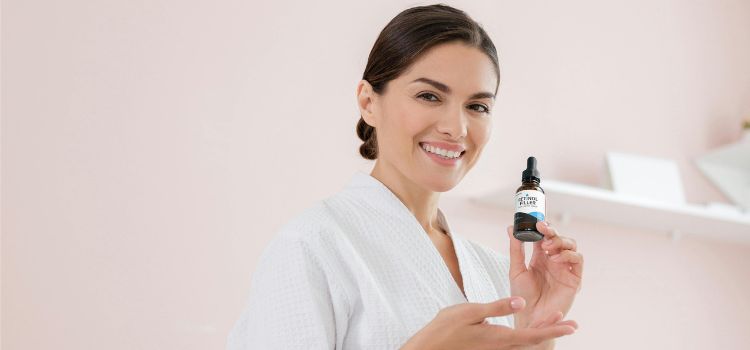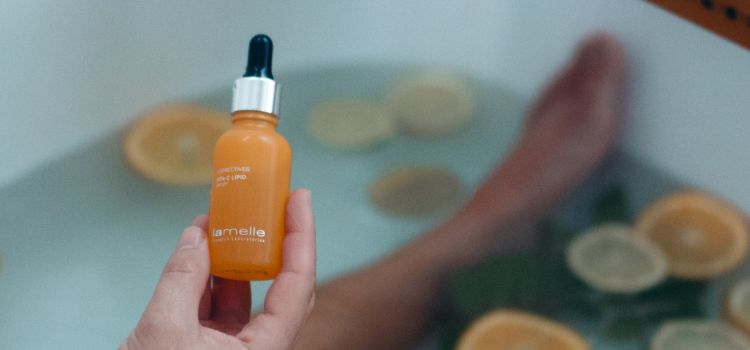Yes, you can use a retinol while breastfeeding, but it is recommended to consult with a healthcare professional first to ensure it is safe for you and your baby. Breastfeeding is a critical time for both the mother and the baby, as the mother needs to ensure that what she consumes or applies on her skin is safe for her little one.

One common concern among breastfeeding mothers is whether it is safe to use retinol, a popular skincare ingredient known for its anti-aging benefits. Retinol belongs to the vitamin A family and is found in many anti-aging products.
However, due to its potential risks, it is crucial for breastfeeding mothers to be aware of the effects it may have on their babies.
We will discuss the safety of using retinol while breastfeeding and the precautions to consider. Remember, always consult with your healthcare provider before incorporating any new skincare products into your routine while breastfeeding.
Understanding Retinol And Its Potential Effects On Breastfeeding
Retinol and its potential effects on breastfeeding are a crucial concern for new mothers. Understanding whether it is safe to use retinol while breastfeeding provides valuable insights for maintaining optimal health for both mother and baby.
Retinol, a derivative of vitamin A, is a popular ingredient in skincare products due to its ability to promote cell turnover and improve the appearance of skin. However, when it comes to using retinol while breastfeeding, there are concerns about its potential effects on breast milk.
In this section, we will delve into the basics of retinol and its common uses in skincare products, explore how retinol may be absorbed into the bloodstream and potentially affect breast milk, and examine expert opinions on the safety of using retinol while breastfeeding.
The Basics Of Retinol And Its Common Uses In Skincare Products
- Retinol: A derivative of vitamin A, retinol is known for its anti-aging properties and has been widely used in skincare products.
- Skin benefits: Retinol helps stimulate collagen production, reduces the appearance of wrinkles, and can even out skin tone.
- Common usage: Retinol can be found in various forms, such as creams, serums, and oils, and it is often used in nighttime skincare routines.
- Considered safe for non-pregnant individuals: Retinol is generally safe for use by individuals who are not pregnant or breastfeeding.
How Retinol May Be Absorbed Into The Bloodstream And Potentially Affect Breast Milk
- Absorption into the bloodstream: When applied topically, retinol can be absorbed into the bloodstream through the skin.
- Potential transfer to breast milk: Substances that enter the bloodstream have the potential to transfer into breast milk. This raises concerns about the potential effects of retinol on breastfeeding infants.
- Limited research on retinol in breast milk: There is a lack of extensive research specifically examining the presence and effects of retinol in breast milk.
Expert Opinions On The Safety Of Using Retinol While Breastfeeding
Due to the limited research on retinol usage during breastfeeding, there is no definitive answer on its safety. It is recommended to consult with a healthcare provider who can provide personalized guidance based on individual circumstances.
Some experts suggest using alternative skincare ingredients that are considered safe during breastfeeding, such as hyaluronic acid or vitamin C. If retinol use is deemed necessary, experts advise minimizing the application area and using low concentrations to reduce the potential risks.
Remember, before making any decisions about using retinol while breastfeeding, it is important to consult with a healthcare provider who can evaluate your specific situation and provide appropriate guidance.
Potential Risks And Precautions Of Using Retinol For Breastfeeding Mothers
Breastfeeding mothers should exercise caution when considering the use of retinol products. While there is limited research on the subject, it is generally advised to avoid retinol while breastfeeding due to potential risks to the baby.

It is always recommended to consult with a healthcare professional before using any skincare products during this time.
Retinol, a derivative of vitamin A, has gained popularity in the skincare world for its numerous benefits. However, for breastfeeding mothers, the use of retinol raises concerns about the potential risks it may pose to both the mother and the baby.
In this section, we will delve into the potential side effects and risks associated with retinol use during breastfeeding, as well as the precautions that breastfeeding mothers can take to minimize any potential risks.
We will also seek expert advice on modifying skincare routines while breastfeeding, ensuring the safety and health of both the mother and the baby.
Possible Side Effects Or Risks Associated With Retinol Use During Breastfeeding
- Retinol can pass through breast milk and potentially harm the baby.
- High doses of retinol can lead to vitamin A toxicity in both the mother and the baby, causing a range of symptoms such as nausea, dizziness, headaches, and skin irritation.
- There is limited research on the effects of retinol on breastfed infants, making it difficult to assess the exact risks.
Precautions That Breastfeeding Mothers Can Take To Minimize Any Potential Risks
- Consult with your healthcare provider before starting any new skincare products that contain retinol.
- Use alternative skincare ingredients that are safe for breastfeeding, such as hyaluronic acid, niacinamide, or vitamin C.
- Consider lower concentrations of retinol or opt for retinol alternatives, such as bakuchiol.
- Apply retinol products only on areas of the skin that are not in close contact with the baby, such as the face, avoiding the chest or breasts.
- Wash your hands thoroughly after applying retinol products to minimize transfer to the baby.
Expert Advice On Modifying Skincare Routines While Breastfeeding
According to dermatologists, it is generally recommended to avoid using retinol while breastfeeding due to the potential risks. Instead, focus on a gentle skincare routine that includes cleansing, moisturizing, and sun protection.
Opt for skincare products that are labeled safe for use during breastfeeding or contain pregnancy-safe ingredients. Hydrate your skin with moisturizers that contain ingredients like glycerin and ceramides to maintain its moisture barrier.
Protect your skin from the sun’s harmful UV rays by using a broad-spectrum sunscreen with an SPF of 30 or higher. Remember that every individual’s skin is unique, and consulting with a dermatologist or healthcare provider is crucial to tailor your skincare routine to your specific needs.
While retinol has proven benefits in skincare, its use during breastfeeding requires caution. To ensure the safety of both the mother and the baby, it is advisable to consult with healthcare professionals, consider alternative skincare ingredients, and modify the skincare routine accordingly.
Alternatives To Retinol For Skincare During Breastfeeding
Looking for alternatives to retinol for your skincare routine while breastfeeding? Discover safe and effective options that nourish and protect your skin without compromising your baby’s health. Explore natural ingredients like hyaluronic acid, vitamin C, and niacinamide for a radiant complexion.
Safe And Effective Alternatives To Retinol For Skincare While Breastfeeding
When it comes to taking care of your skin while breastfeeding, it’s important to understand that certain ingredients, like retinol, may not be suitable for use during this time. However, there are safe and effective alternatives available that can provide similar benefits without any potential risks to you or your baby.
Here are some natural ingredients and products that you can consider incorporating into your skincare routine:
- Vitamin C: Known for its antioxidant properties, vitamin C can help brighten the skin, fade dark spots, and promote collagen production. Look for products that contain stabilized forms of vitamin C, such as ascorbic acid or tetrahexyldecyl ascorbate.

- Hyaluronic acid: This hydrating ingredient is safe to use while breastfeeding and can help retain moisture in the skin, making it plump and supple. Look for serums or moisturizers that contain hyaluronic acid for optimum hydration.
- Niacinamide: Also known as vitamin B3, niacinamide is a multitasking ingredient that can help improve skin texture, minimize pores, and control sebum production. It is gentle and safe to use while breastfeeding.
- Glycolic acid: A type of alpha hydroxy acid (AHA), glycolic acid can help exfoliate the top layer of the skin, revealing a brighter complexion. Opt for products with a lower concentration (around 5-10%) for safe use during breastfeeding.
- Peptides: Peptides are small chains of amino acids that can help support collagen production and improve skin elasticity. Look for skincare products that contain peptide complexes to target signs of aging while breastfeeding.
Natural Ingredients And Products That Can Provide Similar Benefits To Retinol
If you prefer to use natural skincare products, here are some ingredients that can provide similar benefits to retinol without any potential risks:
- Rosehip seed oil: Rich in vitamin A and essential fatty acids, rosehip seed oil can help promote cell turnover, reduce the appearance of scars and dark spots, and improve overall skin tone and texture. It is a great alternative for those avoiding retinol.
- Bakuchiol: Derived from the seeds of the babchi plant, bakuchiol is a natural alternative to retinol that has been shown to have similar benefits, such as improving fine lines, wrinkles, and skin texture. Look for products that specifically mention bakuchiol as an active ingredient.
- Green tea extract: Packed with antioxidants, green tea extract can help protect the skin against free radical damage and reduce inflammation. It also has anti-aging properties and can improve overall skin health.
- Marula oil: Known for its moisturizing and nourishing properties, marula oil is rich in antioxidants and fatty acids. It can help hydrate the skin, improve elasticity, and reduce the appearance of fine lines and wrinkles.
Expert-Recommended Skincare Routines And Products For Breastfeeding Mothers
When it comes to skincare routines and products for breastfeeding mothers, here are some expert recommendations:
- Cleanse: Start your skincare routine by cleansing your face with a gentle, non-stripping cleanser. Look for cleansers that are free from harsh ingredients like sulfates and fragrance.
- Hydrate: Follow cleansing with a hydrating toner or essence to replenish moisture in the skin. Look for ingredients like hyaluronic acid or glycerin.
- Treat: If you have specific skin concerns, such as dark spots or uneven skin tone, consider incorporating a targeted treatment like a vitamin C serum or niacinamide serum into your routine.
- Moisturize: Hydrate your skin with a moisturizer suitable for your skin type. Look for products that are lightweight, non-comedogenic, and hypoallergenic.
- Protect: Don’t forget to apply a broad-spectrum sunscreen with at least SPF 30 every morning to protect your skin from harmful UV rays.
Remember, it’s always best to consult with a dermatologist or healthcare provider before introducing any new skincare products or ingredients into your routine, especially if you are breastfeeding.
Frequently Asked Questions
Can You Use Topical Retinol While Breastfeeding?
Topical retinol is not recommended while breastfeeding due to the lack of research.
Can I Use Retinol And Niacinamide While Breastfeeding?
Yes, you can use retinol and niacinamide while breastfeeding but it’s crucial to consult with your healthcare provider first.
Can You Use Anti Aging Products While Breastfeeding?
Yes, it is generally safe to use anti-aging products while breastfeeding, but consult your doctor first.
Can I Use Vitamin C Serum While Breastfeeding?
Yes, it is safe to use vitamin C serum while breastfeeding.
Conclusion
To summarize, while retinol is generally considered safe to use topically while breastfeeding, it is advisable to consult with your healthcare provider before incorporating it into your skincare routine. They can provide personalized recommendations based on your specific situation and the potential risks involved.
If you decide to use a retinol product, make sure to choose one with a low concentration and monitor your skin for any adverse reactions. Remember to always follow the instructions provided by the manufacturer and be mindful of the potential transfer of the product to your baby through breastfeeding.
It is also worth exploring alternative skincare ingredients and practices that can help address your concerns without the potential risks associated with retinol. Your healthcare provider is your best resource in ensuring both your and your baby’s health and well-being.
Leave a Reply